
The provision of Special Educational Needs and Disabilities (SEND) services in Malaysia has improved over the years, but there are still significant gaps that impact both the quality and accessibility of support for SEND children. These gaps are found in various areas, including resources, teacher training, and inclusive education policies.
There is a shortage of educators who are specifically trained to handle SEND students, particularly in rural areas. While there are institutions providing SEND training, the number of teachers graduating from these programs is insufficient to meet the growing demand for inclusive education.
Many mainstream teachers lack the necessary training to identify and support SEND students, especially in regular public schools. Professional development opportunities related to SEND education are often limited and not standardized across the country.
Most specialized schools or centers for SEND education are concentrated in urban areas like Kuala Lumpur, Selangor, and Penang. Children in rural or remote areas often lack access to these specialized facilities, forcing parents to either move or accept inadequate support.
Although Malaysia has made some efforts toward inclusive education, many mainstream schools are not adequately equipped with the necessary resources or trained staff to support SEND children. This leaves many children with disabilities either excluded from the education system or placed in specialized schools, which may limit social integration.
Many schools, even those that accept SEND students, lack the proper learning aids, materials, and assistive technologies (such as braille books, hearing aids, or mobility devices) required to support children with disabilities.
Many schools and educational institutions in Malaysia are not designed to be physically accessible to students with mobility impairments. There are limited ramps, elevators, or other accessible facilities, making it challenging for children with physical disabilities to attend regular schools.
Early diagnosis and intervention are critical for the development of children with special needs, particularly those with conditions such as autism, Down syndrome, and learning disabilities. However, there is a lack of comprehensive early intervention programs across the country, particularly in underserved regions.
The process of diagnosing disabilities is often slow, especially in public healthcare and education systems. Many children with developmental delays or learning disabilities are not diagnosed early, delaying critical support services.
Lack of Financial Assistance: SEND care can be costly, especially for families with low incomes. While the government provides some financial support through programs like the Bantuan Khas OKU (Special Aid for People with Disabilities), the funding is often inadequate to cover the extensive costs of therapies, specialized schooling, or adaptive equipment.
Limited Community Support Networks: Families with SEND children often feel isolated and unsupported, particularly in rural areas where there are fewer community organizations, support groups, or networks that can offer guidance and resources.
Policy vs. Practice: While Malaysia has policies that promote inclusive education, such as the Education Act 1996 and the Special Education Regulations 2013, their implementation is inconsistent across the country. Many mainstream schools lack the funding or motivation to make the necessary adjustments to become truly inclusive environments for SEND children.
Attitudinal Barriers: Cultural perceptions and stigma around disabilities still exist in some parts of Malaysia, which can discourage families from seeking appropriate support for their children and can lead to social isolation for SEND students. This also affects the level of commitment from some schools to fully include SEND students in regular classrooms.
Varying Standards: The quality of special education programs differs significantly between schools and regions. Some schools may offer comprehensive support with trained staff and well-equipped facilities, while others may lack even basic resources and expertise to cater to SEND students.
Specialized Schools Overloaded: The limited number of specialized schools in urban areas is often overwhelmed by demand, leading to long waiting lists or overcrowded classrooms, which impacts the quality of education and care provided to SEND students.
Gap in Transition to Adulthood: Many SEND students, particularly those with intellectual or developmental disabilities, face challenges transitioning from school to the workforce due to the lack of vocational training programs tailored to their needs. The existing vocational programs are not always well-suited to children with disabilities, leaving many unable to find employment or live independently after schooling.
Limited Data on SEND Population: There is a lack of comprehensive, up-to-date data on the number of SEND children in Malaysia, the types of disabilities they face, and the specific needs for support. This makes it difficult for policymakers to allocate resources and plan effective programs for the SEND community.
The key areas where Malaysia's SEND provision needs improvement include better teacher training, more accessible and equipped schools, increased early intervention services, and stronger community and family support networks. Despite government initiatives to promote inclusive education, the execution is inconsistent, leaving many SEND children underserved. Addressing these gaps is critical for ensuring that all children, regardless of ability, have access to quality education and support services.
